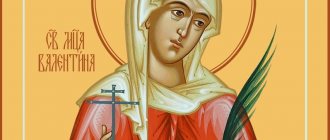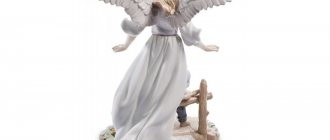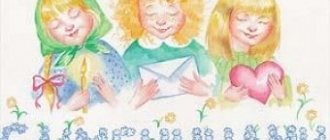With the revival of Orthodox traditions in our country, many questions arise related to terms and names. What are name days, how do they differ from namesake days and angel’s day? Who is the patron saint, and how to determine important days according to the Orthodox calendar? Let's consider all the questions in detail.
The meaning of the name in Christianity
The Christian Church attaches great importance to the choice of a person’s name, seeing in this a special meaning and sacredness. It is believed that the name is the key and bridge through which a person communicates with God. When performing the sacrament of baptism, the Orthodox Church gives a person a name that will become a guide in contact with God.
In past times, every Christian name was considered holy and required respect. The Church Fathers teach: the universe was created in name and word, and it is maintained by them.
The commonality of Orthodox names unites all believers into one whole - God's chosen people.
Naming a baby after a saint meant guiding him on the true and pious path. This was due to the belief that the name of a canonized saint, which was realized in a blessed path, would lead a new person to holiness. It is believed that with the power of his name the saint fills his fellow-name with grace. That is, it has a formative beginning.
The Orthodox name book has evolved over centuries. The meaning of the name in the Orthodox tradition is so strong that even the iconographic face must be confirmed by the holy name. Therefore, the names of the saints and angels depicted are always written on icons.
Since ancient times, in Rus' there has been a tradition of naming several names, so the baptismal name was taken for granted. In past times, a person could have a name from birth, a nickname and two baptismal names - one for everyone, and the second was known only to the clergy.
However, nicknames did not sink into oblivion, but organically turned into surnames. This can be judged by modern surnames - Naydenov, Nekrasov, Zhdanov. These are all former nicknames of a person. In Orthodoxy, some pre-Christian names were also preserved and even canonized - Vladimir, Yaroslav, Vsevolod, Svyatoslav.
With the adoption of Christianity, the name book was enriched with the names of other peoples - Jewish, Greek, Byzantine, Roman. For example, the common Russian names Marya and Ivan actually have Jewish roots. The church fathers believe that there is no need to separate names by nationality, since they are a universal property.
What are name days and why do they not coincide with a birthday?
Name days are the day of remembrance of the saint in whose honor the person received his name. Some saints have only one memorial date per year (for example, St. Vladislav - October 7). Others have several names (for example, Tatyana, Elizaveta, Maxim, Alexey, Alexander, etc.). In this case, the name day is considered to be the closest of these dates after the birthday forward according to the calendar.
Name day is the day of remembrance of the saint in whose honor a person received his name
The remaining days of remembrance are considered small name days.
In pre-revolutionary Russia, babies were baptized very soon after birth: on the 3rd, 8th day, less often - on the 40th day after birth. In this case, the name was traditionally chosen from the calendar (they looked directly at the date of baptism and chose from the corresponding names). Therefore, at that time, name days traditionally coincided with the day of baptism.
Before the revolution, the name of the child at baptism was chosen according to the calendar, the name day coincided with the day of baptism
In Orthodoxy, it is believed that the saint in whose honor the child is named will always monitor his fate, guide him in difficult times, and protect him from adversity.
Today the situation is completely different. Many children, of course, are named after saints (for example, Elena, Irina, Ksenia, Maxim, Alexey, Sergey, Mikhail, etc.), but this is done directly at the birth of the child. And during baptism (it can be several months later), the priest is simply told the name. Thus, the memory of the saint (that is, the patron saint of the child) can be celebrated far from the very day of his baptism.
Name day and Angel's day - what's the difference?
The Orthodox Church teaches that a person receives a guardian angel only through the sacrament of baptism. This day is called the day of the angel, the second birth of man - spiritual. In the old days, the day of the angel was called the namesake or name day, because at baptism they gave the name of the saint honored on this day. So namesake day and angel day are different names for the same day, but only in the old days.
Baptismal names for children were chosen strictly according to the calendar, in which the names of the saints honored on this day were recorded. Parents could choose any of the names to choose from. With the advent of Soviet power, this tradition lost its meaning, and children began to be named arbitrarily, for example, in honor of their grandfather or father.
On the day of baptism, the baby received:
- new name;
- guardian angel;
- patron saint.
The day of baptism was considered a great day in a person’s life and was celebrated according to all traditions. However, in our time, all this has been lost and forgotten. How to determine your patron saint? If you do not remember the day of baptism, then the patron can be chosen according to the calendar. For example, a person with the name Nicholas has his co-name Saint Nicholas as his patron. The day of veneration of the saint of the same name is the name day of a person or the day of an angel.
What should you do if the name of the patron saint is mentioned in the calendar several times a year? In this case, you should choose the day closest to (after) your date of birth. This day will be the name day.
Angel's Day is the birthday of the soul, the name day (name day) is the acquisition of a patron saint.
What should you do before your name day? On the eve of the name day, a person should confess and spend the day itself in holiness and prayerful reading. In the morning, it is advisable to attend the liturgy and receive communion. Also on this day you can make requests for urgent matters and order a prayer service to the patron saint. The Church Fathers instruct us to imitate in our lives the holy life of our patron.
Angel's Day and Name Day on different days
Can name day and angel day be on different days? If a person at baptism was given the name of a patron who is not honored on this day, then the name day does not coincide with the day of the angel. This means that a person can celebrate the day of an angel in memory of his baptism, and celebrate his name day on the day of honoring his fellow baptism.
Sometimes all holidays coincide with the day of physical birth, if a person is named according to the calendar and was baptized on his physical birthday. But this is not the rule for everyone.
How to determine your angel day? There is a tradition to celebrate the day of the angel on the day of the namesake, that is, on the day of honoring one’s heavenly patron. This tradition is being revived in our time, which also speaks of the revival of Orthodoxy among the Russian people.
Naming
A name is a child's personal name given after birth. Not only humans receive a name: names are given to animals and plants, objects and objects of our world. This tradition is described in the Bible when the Lord asked Adam to give names to all animals and heavenly bodies.
Find out what awaits you today - Horoscope for today for all zodiac signs
Due to numerous requests from subscribers, we have prepared an accurate horoscope application for mobile phones. Forecasts will arrive for your zodiac sign every morning - it's impossible to miss! Download for free: Daily Horoscope 2020 (available on Android)
Before Christianity, in Rus' they also gave names to newborns, and the name was associated with the external signs of the baby or some characteristic features. After the baptism of Rus', the situation changed, and Christians began to be given new names at baptism. For example, Prince Vladimir Krasno Solnyshko received the name Vasily. Names were given special meaning: it was believed that they determine a person’s destiny.
In modern times, names come in a wide variety, but before the revolution, children were called in accordance with the Saints. The names of the saints of the Orthodox Church by month are recorded in the Saints (months of words). Previously, parents did not care about choosing a name for their child, but named him in honor of their favorite saint. The main thing is that this name corresponds to the month of birth, although this is not necessary.
In the Saints you can find names of ancient Greek and Hebrew origin. Which name should you choose? To do the right thing, follow these tips:
- You can name a child after the saint on whose day he was born.
- If the Orthodox calendar does not honor a saint on the baby’s birthday, choose the name of the next day.
- If you choose a worldly name that is not in the Saints, at baptism the baby will receive a different name - he will have two names.
- Before naming your baby, familiarize yourself with the meaning of the chosen name.
- If you are not sure about the correct choice of names, ask your priest for help.
There are more than 1,700 male and female names recorded in the Orthodox Saints, so choosing a name is not particularly difficult. Recently, black witchcraft has begun to spread, so it is advisable to keep the name on the cross (given at baptism) secret. This will save a person from causing intentional damage.
Name day celebration
Previously, in Rus', name days were revered above the physical birthday; this day was celebrated on a grand scale. On the eve of the holiday, birthday rolls and loaves were baked and beer was brewed. On the holiday itself, the family of the birthday boy attended mass, ordered a prayer service for health, and honored the patron saint. Then they distributed pies and treats to relatives and friends, and in the evening they had a festive meal.
Tsar's name days in Rus' were considered a national holiday and were celebrated with special pomp. Subjects brought gifts to the king and took part in a festive meal, during which many years were always sung. In some cases, the king himself distributed pies to his subjects. Birthday rolls were distributed for the people, which they eagerly awaited. Later, the royal name days began to be celebrated with special pomp - fireworks, military parades and various performances.
In the Soviet years, especially immediately after the revolution, there was an active struggle against name days. People were systematically weaned off ancient customs, trying to replace them with new ones. For example, a baby might be symbolically enrolled in a union as a mock baptism, and godparents would be replaced by so-called “honorary parents.” It got to the point that in the 20s they banned Chukovsky’s fairy tale “The Tsokotukha Fly” only because it mentioned name days.
What was celebrated annually in Rus': name day, baptism or birthday
For many centuries, Russian people greatly revered the name day holiday (at the same time it was also the day of the angel). On this day, they certainly visited the temple to pray to their saint and receive communion. Relatives walked with the birthday boy, they ordered a prayer service for health and lit candles.
A household tradition was the preparation of loaves - large beautifully shaped pies with filling. On the top of them was written the name of the hero of the occasion. In the evening, family and friends gathered at home, and the godfather and mother were certainly invited. All guests were treated to loaves of bread. One pie was broken over the birthday boy’s head, raisins fell out of it, and the guests repeated: “May gold fall on you like that.”
The traditional symbol of name day in Rus' is a festive loaf
Today, the loaf tradition has transformed into the obligatory presence of a beautiful cake on the table during a birthday celebration.
On the occasion of the holiday, the birthday boy was given heart-warming gifts:
- candles for prayer,
- icons,
- shrines brought from monasteries,
- spiritual books, etc.








